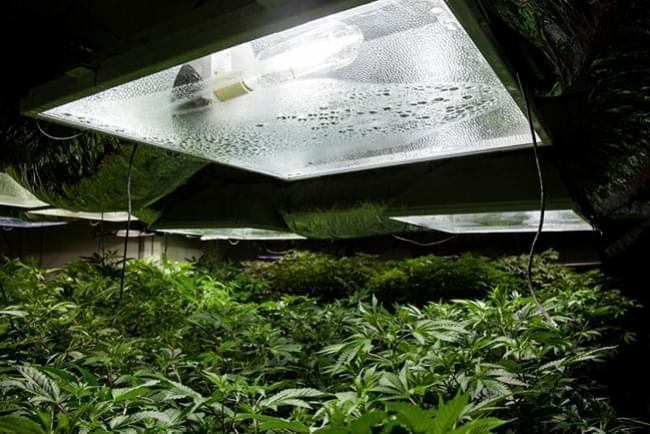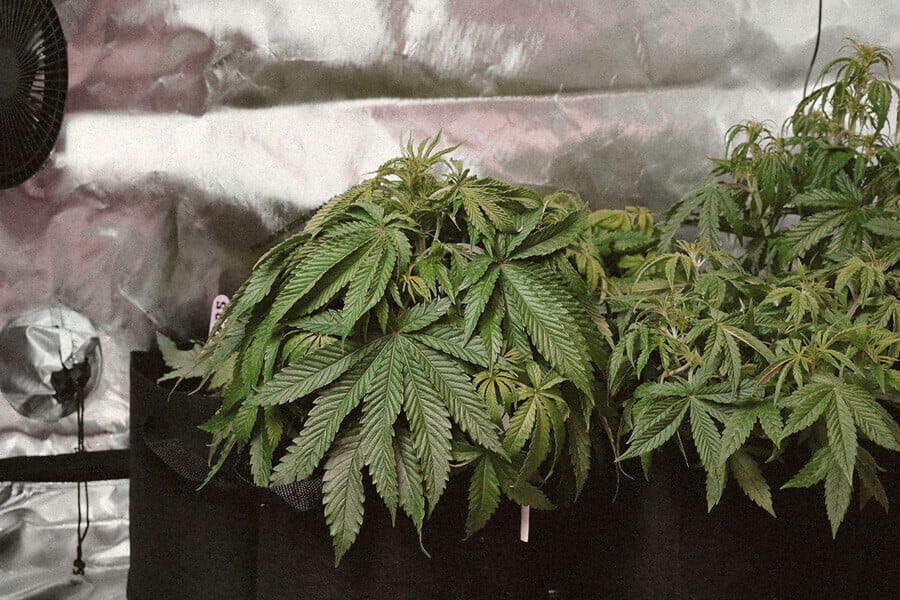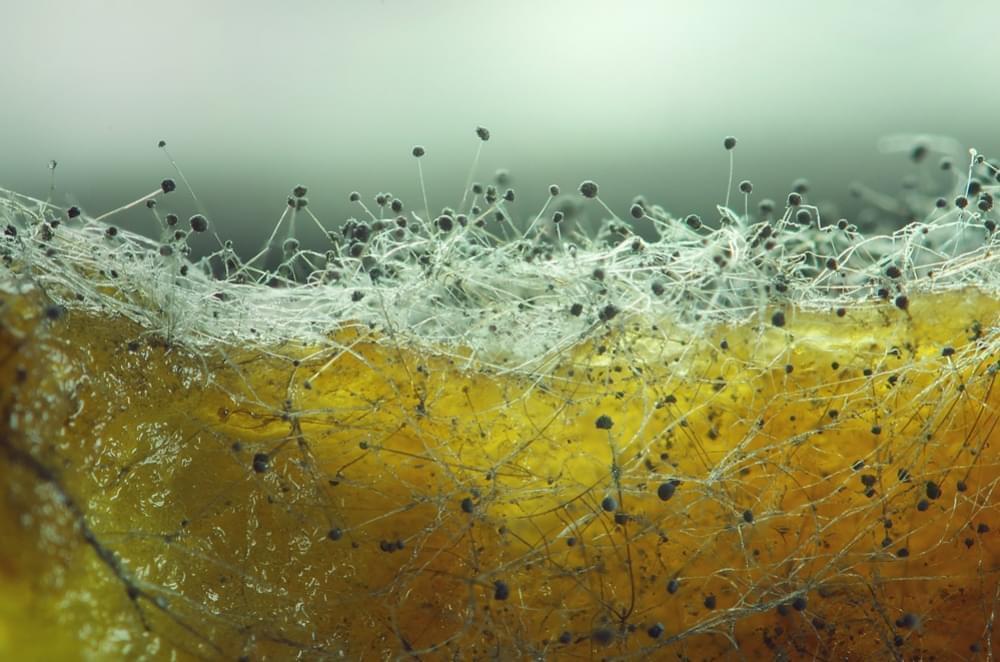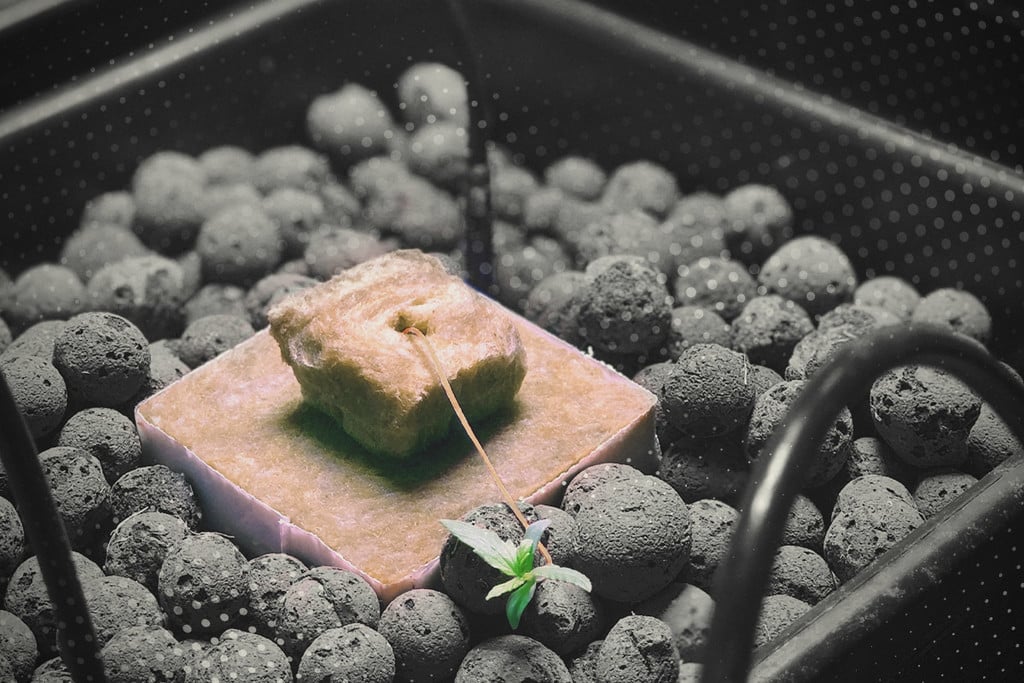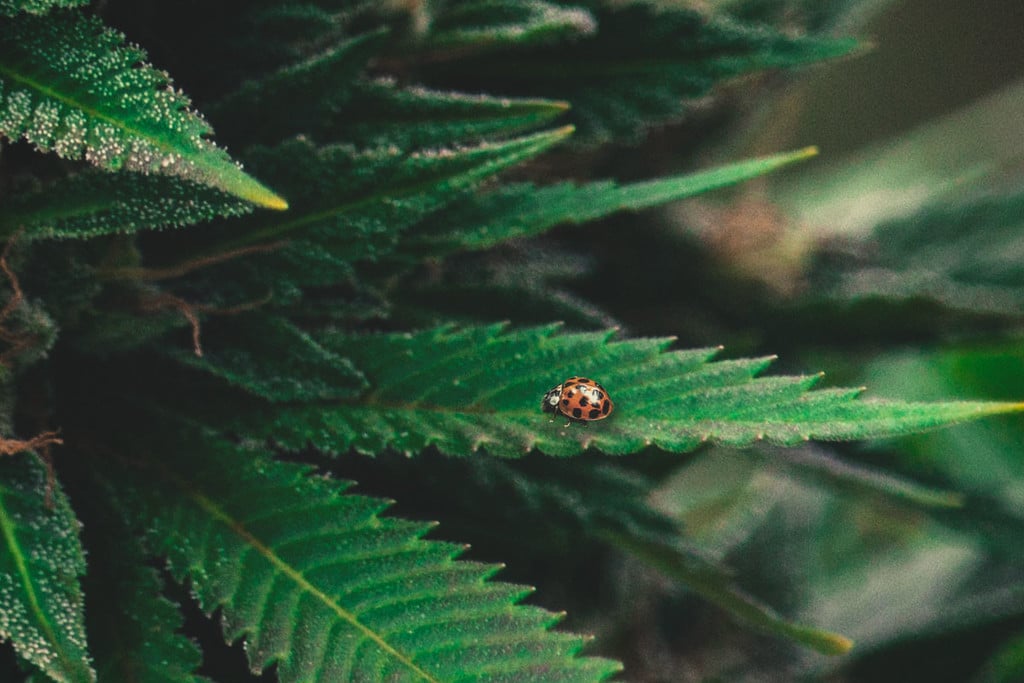.

Cannabis and Sooty Mould: How to Treat and Prevent
If you've ever grown cannabis, you'll know that cultivating the herb rarely comes without its challenges. Among many pests and diseases, sooty mould can cause stunted growth and disappointing yields. Find out what you can do to prevent and treat this annoying occurrence without the use of harsh chemicals. Never let it impact your plants again!
You just stepped out into your garden and stumbled across something shocking: black cannabis leaves! What on earth is that sooty substance on your fan leaves? How did it get there? And what can you do to get rid of it as soon as possible? Find out everything you need to know about preventing and treating sooty mould on weed plants below.
Contents:
What Is Sooty Mould?
The name “sooty mould” doesn’t refer to a specific pathogen or disease state. Instead, it’s an umbrella term used to describe a variety of different fungal species that are attracted to damaged plant tissues caused by insects.
As you’re probably aware, plants are equipped with the cellular machinery to create their own sugar supply using sunlight as a power source. On top of this, they also work overtime to withdraw nutritious minerals from the soil. The weed plants growing in your garden or grow room also feature a vascular system that allows them to move these components to where they’re needed.
So, plants are filled with flowing streams of sugar and minerals; this sounds like a banquet in the eyes of a hungry insect. However, only certain species have the piercing mouthparts necessary to penetrate the cellulose-rich flesh of plants and tap into the sap flow. After dining, these insects also have to defecate. As it happens, all of the sap-glugging species don’t have the decency to depart to tiny little insect toilets in nearby trees. Nope, they simply squat and drop right on your cannabis plant leaves.
Amber, sticky, and glistening in appearance, sap-eating insect turds are referred to as “honeydew”. Although literally just insect poop, honeydew lies at the heart of a lot of ecosystem activity. Ants farm aphids to make them produce honeydew, and honey bees forage for it and make it into honey.
Aside from filling the bellies of certain insects, honeydew also serves as a food source for the fungal species that are collectively known as sooty mould. After coming into contact with this nutrient source, the black, hair-like growth (known as mycelium) of these species begins to spread across plant surfaces. The dark colour of these fungal threads has a dusty or sooty appearance. Left unchecked, the soot can completely overrun the leaves of many different plant species, including cannabis.

Can Sooty Mould Kill Marijuana Plants?
Unlike fungal plant diseases such as Pythium, sooty mould doesn’t infect plant tissue. Instead, it remains on the surface of leaves where it tracks down and consumes honeydew. Because it isn’t a systematic pathogen, sooty mould doesn’t pose much of a threat in most circumstances.
The threat of sooty mould depends largely on the extent of the pest infestation at its core. A couple of sap-eating bugs here and there won’t generate much honeydew. Even if sooty mould does show up in this situation, it won’t have much fuel to spread far. Such minor pest infestations are normal in an organic garden, and populations are kept in balance through the presence of companion plants, predatory insects, and birds.
However, not all infestations are minor. Sometimes, things spiral out of control. A lack of biodiversity in a garden can quickly give way to the dominance of certain pests. High populations of sap-suckers can leave behind enough honeydew for sooty mould to become a threat to plant health and productivity. As the black mycelium spreads, it can become thick enough to reduce the amount of sunlight hitting the surfaces of leaves. The subsequent drop in photosynthesis can stunt plant growth and potentially result in smaller harvests and lower THC levels. However, even the worst cases of sooty mould are unlikely to completely kill a plant.
What Causes Sooty Mould?
You know that honeydew buildup on plant surfaces causes sooty mould. But what pest species leave this excrement behind after feasting on sap? Discover several of the key culprits below.
Aphids
Sooty mould on plants is, more often than not, the result of pesky aphids. These tiny soft-bodied insects are among the most common of all cannabis pests. Aphids are designed to consume plant sap; their sharp and slender mouthparts make this an easy task that comes naturally to them. Because aphids multiply so quickly, they are responsible for more severe cases of sooty mould. Other symptoms of an aphid infestation include twisted and curled leaves, stunted growth, yellow leaves, wilting, and visible honeydew.
Mealybugs
Mealybugs are easily the most unsightly of cannabis pests. These small insects are covered in a white, waxy coating that makes them look cotton-wrapped and ghost-like. Not only does their exterior look odd, but it also protects them against some of the insecticides growers spray on them. They may look small and harmful to the untrained eye, but mealybugs have rather destructive eating habits that make them a pain for any gardener. Their piercing mouthparts can cause significant damage to plant tissue, and the formation of sooty mould on the honeydew they produce only adds salt to the wound.
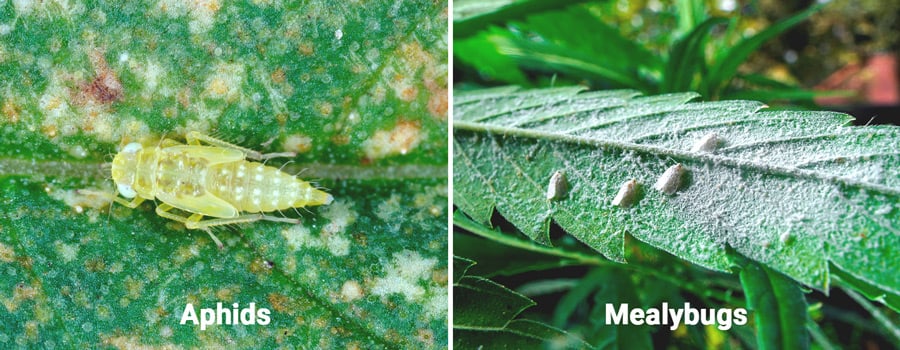
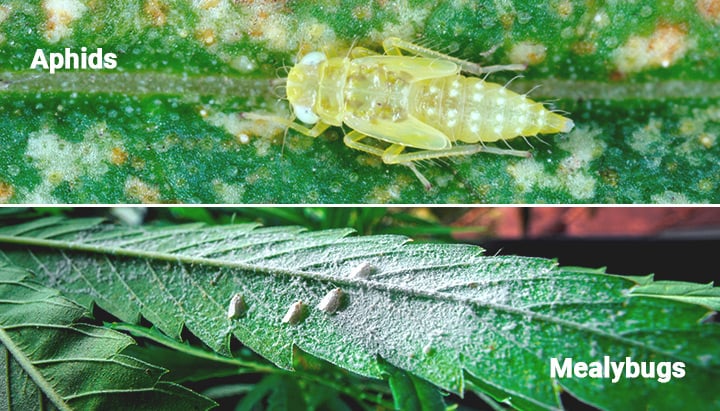
Whiteflies
Not all honeydew-producing pests are terrestrial in nature—some even have wings! Whiteflies are small insects that get their name from their powdery wings. Much like mealybugs, they are also coated in a waxy white substance. You can tell when whiteflies are present thanks to other symptoms, including a loss of plant vigour, wilting, yellowing, and honeydew on leaves. They also possess sharp, lance-like mouthparts that enable them to tap into plant vasculature and withdraw sap. However, traces of honeydew aren’t the only detrimental things they leave behind after a meal. They’re also vectors of plant viruses that can leave your crop in pretty bad shape.
Leafhoppers
Leafhoppers are typically around half centimetre in length. Their bodies are wedge-shaped and vary in colour from brown and green to yellow. They’re members of the Cicadellidae family and also have a strong attraction to plant sap. Not only do they pierce the tissue of leaves, but they also sink their mouthparts into stems, and even buds! Large infestations of leafhoppers can inflict considerable stress on plants, preventing them from reaching their full genetic potential. Of course, the appearance of sooty mould following honeydew production contributes to an overall lack of vigour and decreased bud quality.
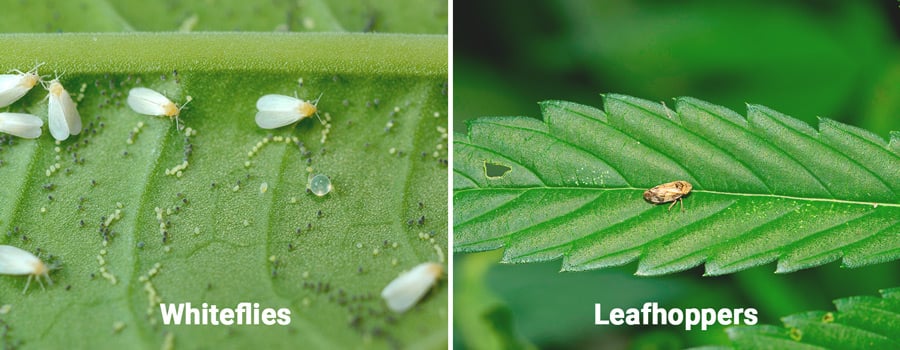
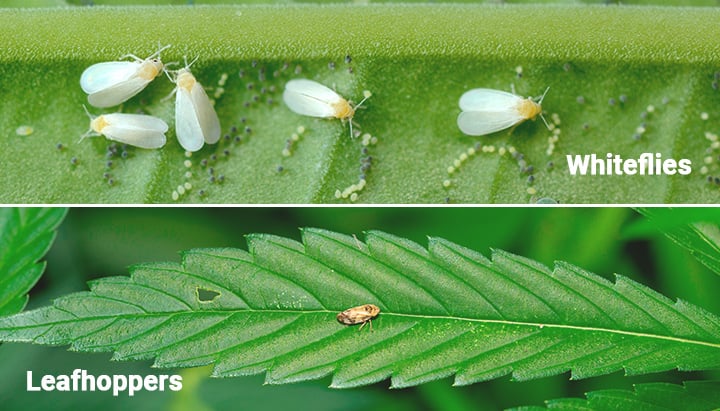
How to Treat Sooty Mould on Cannabis
Sooty mould suddenly doesn’t seem so intimidating, right? Sure, it looks bad and does have the potential to impact yields, but compared to systematic plant pathogens, it’s much less devastating. With that said, you certainly don't want to leave these fungi to linger and become more established. You’ll be pleased to hear that there are several simple but effective ways of tackling sooty mould. Check out the most efficient below.
Wipe Plant Surfaces
Let’s start things off simple! Yes, wiping your leaves is an effective way of dealing with sooty mould. It might seem almost too simple, but it works wonders at physically removing the fungi that cause this unsightly mess. But before you begin going about removing mycelium from your leaves, know that there’s an optimal way to do things:
- Start off by preparing a cleaning solution. Add a few drops of natural soap into 1 litre of water and mix thoroughly.
- Dip a cloth or sponge into the cleaning solution and wring out the excess fluid.
- Gently apply the cloth or sponge to the affected fan leaves. Wipe away the mycelium without applying too much pressure on plant surfaces.
- Continue until you’ve removed all visible fungal threads.
Make a Batch of Compost Tea
After wiping down surfaces, it’ll help to colonise leaf surfaces with a host of beneficial microbes. Brewing up a batch of compost tea will cultivate a rich mix of bacteria, fungi, and other microorganisms. The logic here is that a biodiverse inoculant in the phyllosphere helps to prevent a single species from gaining dominance. In this case, that means sooty mould fungi!
Using nothing but an air stone, a handful of good-quality compost, humic acid, kelp, and fish extract, you can make your own compost tea at home in no time. Use a mister to apply foliar sprays to your crop throughout the entire growing cycle.
How to Prevent Sooty Mould When Growing Weed
If you’re a seasoned cannabis grower, you’ll know by now that prevention always works better than a cure. Preventative measures save time and effort and cut the risk of failed crops massively. Now that you know how to treat sooty mould when it rears its head, it’s time to learn how to prevent it from showing up altogether.
Netting
By simply placing a physical barrier around your plants, you can stop a host of sap-sucking insects from ever touching your plants in the first place. Select a fine insect netting capable of deterring aphids and whiteflies. It’ll allow air, rain, and sunlight to pass through while keeping the root causes of sooty mould off your plants. There are plenty of ways to place netting around your plants, from large PVC hoops to wooden structures and metal piping.
Apply Bacillus Thuringiensis
As you’re now aware, several sap-sucking insects lie at the heart of sooty mould occurrences. Therefore, it makes perfect sense to target the insects instead of constantly wiping away mould while the culprits run free. There are a bunch of integrated pest management strategies that deal with insects without the use of harsh chemicals, including Bacillus thuringiensis (BT).
This naturally occurring bacterium produces toxic proteins that wipe out certain species of insect larvae. You can pick up a bottle from most garden centres and growing shops. Follow product instructions in regards to mixing and application and you’ll quickly reduce the populations of sap-sucking insects in your growing space.
Deploy Beauveria bassiana
Beauveria bassiana (BB) also autumns into the category of biocontrols. However, it differs from BT in that it’s a fungus, not bacteria. More specifically, it’s an entomopathogenic fungus that infects, colonises, and eats certain species of insects (think The Last of Us). It just so happens that BB has quite the appetite for many of the insects that cause sooty mould, including whiteflies and aphids. However, BB lives as somewhat of a shape-shifter. It can also physically enter plants where it exists as an endophyte. Early research[1] shows that inoculating plants with this fungi works as a natural biostimulant.
Beneficial Insects

Maintaining a healthy population of beneficial predatory insects in your garden can also keep the number of sap-sucking critters down. There are several ways to achieve this, including providing the right food and habitat. Plant borders of aromatic and culinary herbs, such as basil and dill, to bring in the good guys. Meanwhile, plenty of Echinacea, sunflowers, borage, and other attractive flowers will also help to boost predator populations. If you live in a particularly urban area, you can also purchase predatory insects, such as ladybugs, and release them into your growing space.
Sooty Mould No More
Say goodbye to black soot on your weed plants! You’re fully aware of how to deal with this situation and how to get rid of sooty mould on plants. Instead of waiting for this pesky mycelium to show up on your fan leaves, you’re ready to deploy a host of preventive measures, including effective biocontrols that strike at the core of the condition. If these fail, you’ve also discovered a couple of treatment options that will work as the perfect backup response.


























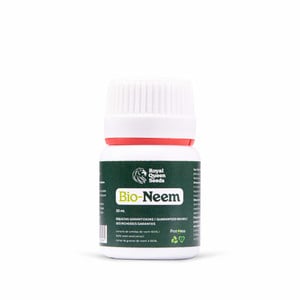




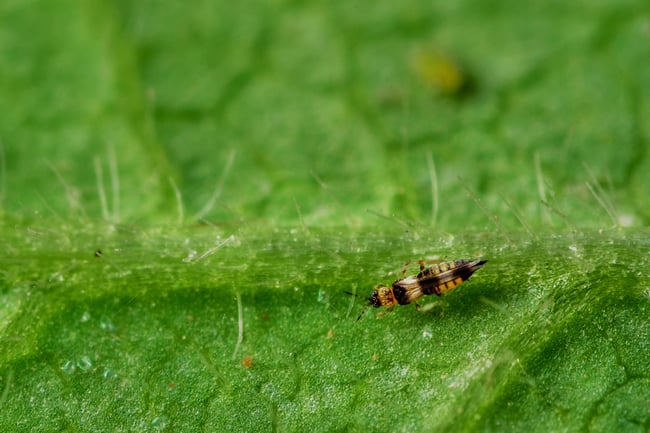








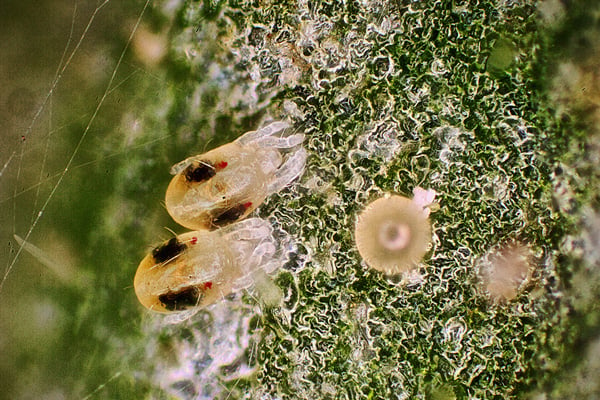
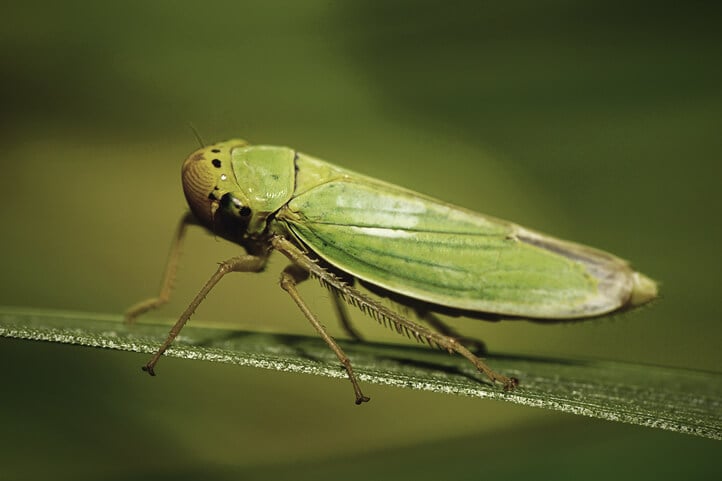
_1.jpg)
